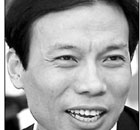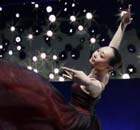Hot on the Web
A friend of athletes, sports and China
By Deng Yaping (China Daily)
Updated: 2010-05-01 09:19
 |
Large Medium Small |
The news that Juan Antonio Samaranch had been admitted to hospital on the morning of April 21 was ominous. The thought of my worst fear coming true paralyzed me momentarily as the radiant face of the almost 90-year-old flashed in front of me. I had met him just two months ago in Vancouver, Canada.
After attending the opening ceremony of the Winter Olympic Village in Vancouver I went to the athletes' canteen to have dinner. The lifetime honorary president of the International Olympic Committee (IOC) was there, too, and invited me to sit beside him. The patriarchal Samaranch was still a good talker and still had a good appetite. But sadly he was not as agile as before, though he asked me about my work and encouraged me to go ahead.
I first met Samaranch at the 41st World Table Tennis Championship in Japan in 1991. He watched the women's table tennis single final between me and a contestant from Democratic People's Republic of Korea. My aggressive game and 3:0 win impressed him, and as the IOC chief he awarded me the gold medal. But more than that, he invited me to visit the IOC headquarters.
A few months later, I did make the trip to Lausanne, Switzerland. "You are the first athlete in the world to be formally invited by the IOC headquarters as its guest," Samaranch told me at a banquet he hosted. It was then that I realized the importance of the invitation. "You should learn English. You are the most excellent athlete I have seen", he said. "Barcelona, my hometown, will host the 25th Olympic Games next year, and I know I will award you the gold medal again."
He then took a notebook out of his pocket and wrote down the table tennis schedule carefully. His seriousness took me by surprise and I assured him that I would try my best.
The next day, I visited the IOC headquarters again and saw two flags fluttering in front of the building. One was the Olympics five-ring flag and the other, China's five-star red flag. "This is special for you," a member of Samaranch's entourage told me after seeing that my eyes were glued to the two flags. I was moved deeply, because it indicated the IOC chief's respect not only for an athlete like me, but also for my motherland.
The next year, I managed to keep my promise and won the gold in women's single at Barcelona Olympics, and receive the medal from Samaranch.
During my athletic career, Samaranch honored me with medals five times, with the most impressive being the one at the Atlanta Olympics in 1996. The IOC president and his wife watched the entire game from the rostrum. My opponent was from Chinese Taipei. She was a tough challenger. So arduous was the game that I broke down after winning 3:2. Samaranch gave me a gentle pat on the cheek while awarding me the gold medal. Perhaps he realized that the game had sapped all my energy.
I cannot remember how many times I met with Samaranch during my playing days. But I remember how he encouraged me to learn English every time we met. I still remember the speech I delivered in English to the IOC athletes' committee the year after I was elected a member of the sub-committee. "We should congratulate Ms Deng Yaping, because she has learned English in only three months," he said after I finished the speech in awkward English. His remarks were followed by round of applause from audience.
Samaranch supported China's bid to host the 2008 Olympic Games. And his influential support helped Beijing win the bid over other candidate cities. The Chinese people cannot thank Samaranch enough for helping realize their long-cherished Olympic dream.
Samaranch joined the dinner in Moscow in 2001 to celebrate Beijing's successful bid to host the 2008 Olympics, and shared the joys of the Chinese people. It was at that party that he advised me not to stay abroad for long. He asked me to return to China after I finished my studies to better serve my country and people. His advice has spurred me to excel as an athlete as well as an official.
Samaranch was loved by sports lovers across the globe, and his death is an enormous loss to world sports. He left us quietly, forever. But I will never forget his remarks and try to fulfill his expectations.
The author is deputy secretary of China Communist Youth League, Beijing Committee, and a former Olympics table tennis gold medalist.







